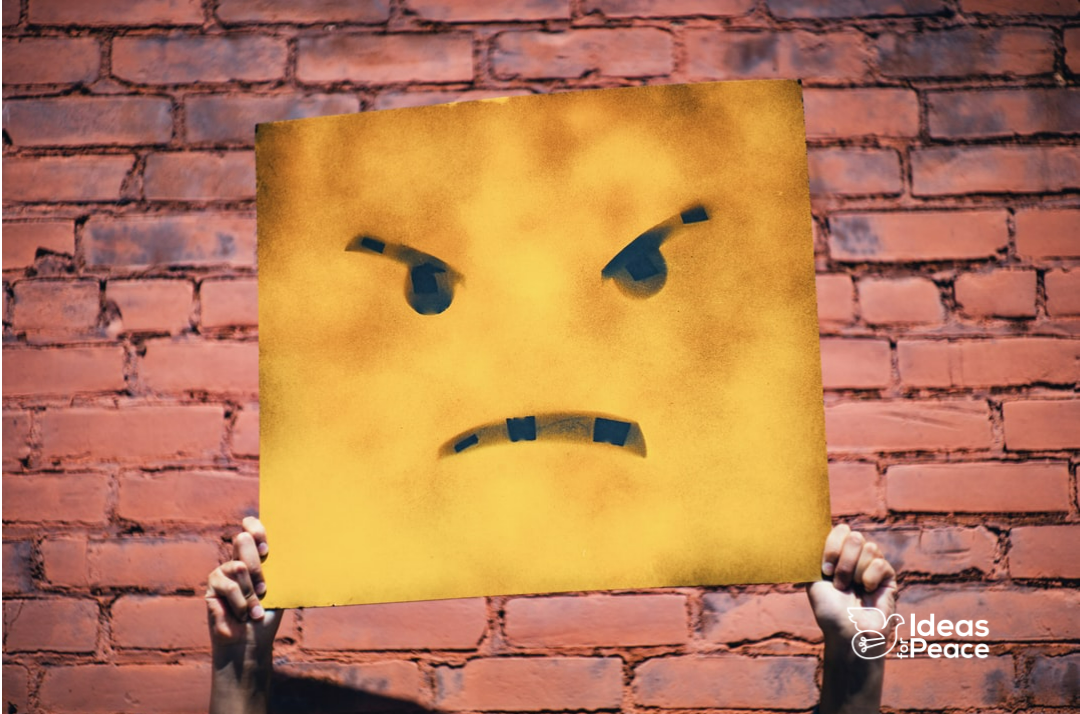Hate Speech in El Salvador
Authors: Marcela Beatriz Aldana Alvarenga, Evelyn Yecenia Álvarez Juárez, Mauricio Antonio López Velado, Enrique Alejandro Pineda Díaz
Translated into English by LEAH ANN DURST-LEE
This essay addresses an analysis of the topic of hate speech, starting from its conceptualization and how it is identified in the written press and social networks in El Salvador, and placing the topic in both a historical and current perspective.
The socio-political situation in El Salvador and the changes experienced in recent years have generated an increase in the dissemination of hate speech in the media narrative.
The analysis of the topic is developed both from the approach of freedom of expression as a human right, as well as the access to information that every citizen has and how hate speech can impact individuals and in some cases join to replicate it, as a result of seeing that even some political leaders are the ones who encourage it.
This essay has been supported by taking into consideration the bibliography related to the topic and the perspectives of the authors.
Definition of Hate Speech
In order to explain what hate speech is, we must go to its definition, which, according to the document "Hate speech and discriminatory speeches" (Garrido, 2022), are those reasonings that attack through the use of discriminatory language towards a person or a group for religious, ethnic, racial, nationality, ancestry, sexual preference or other identity factor reasons.
Hate speech in El Salvador
El Salvador, as well as the entire region, struggles with structural difficulties that delay human development in the country and the improvement of the population's quality of life. Shocking episodes of violence add to the high levels of poverty and insecurity that have plagued the country throughout its history.
Historical context
Since the founding of the republic, the ruling and dominant classes have exercised direct and structural violence against the people. The country seems chained to a cycle of stagnation and struggles to improve the quality of life of the population.
At times, such violence was directed against specific sectors of civil society, which for the ruling classes threatened their economic and political hegemony.
During the military dictatorships, established since 1931, an anti-communist discourse grew and was bought by the population, based upon which any struggle coming from the peasant population was fought and led to justify violent retaliation.
Similarly, a discriminatory discourse was spread against the Arab immigrant population, mostly from Palestine and known as "Turks", who were forbidden to have their own trade and insisted that the Salvadoran population should not trade with them.
In the post-war period, two political forces dominated the powers of the State for two decades. The political polarization within the social fabric, inherited from the civil war, was quite strong during these years.
At present, the new political force proposed the end of such bipartisanship and polarization. It wanted to deliver a young and renewed worldview on the work and responsibility of politicians in this country.
The leader of this new political force was Nayib Bukele, a young man with little experience in politics who did not forget to highlight in his speech the bad management of previous political parties and officials. "With notions such as ‘The same as always’ and slogans ‘Money is enough when nobody steals it’ Bukele planted in his image the idea of something different, new and necessary for El Salvador. While the same old ones were to blame for all the country's problems, he is the savior, the messiah" (Chaves García, 2021).
The feeling is that polarization has increased in the country and that we are in the presence of a stage not seen before of this phenomenon, where, on one side we have a majority political force and on the other, a civil opposition.
Due to this extreme polarization we find expressions of hatred and violence from both sides. Now the State exercises a structural and psychological violence more mediatic and camouflaged; on the side of society, it seems that the messages of hate have increased, where the political inclination is defended and attacked tooth and nail. Unfortunately, this happens
in the context of a digitalized society where expressions of hate abound in social networks such as Twitter and Facebook.
El Salvador has contemplated in its legal framework, since the Constitution adopted in 1983, the defense of freedom of expression and opinion:
All persons may freely express and disseminate their thoughts as long as it does not subvert public order, nor injure the morals, honor, or private life of others. The exercise of this right shall not be subject to prior examination, censorship or bail; but those who, making use of it, violate the laws, shall be liable for the crime they commit. (Constitution of the Republic of El Salvador, 1983, Article 6).
Present
State of exception
The Constitution of the Republic of El Salvador allows, through a series of articles, the establishment of a state of exception, which is a measure of last resort to combat a national emergency situation that gives the power to suspend certain articles of the same constitution and to grant special
that gives the power to suspend certain articles of the same constitution and to grant special tools to the Executive branch to combat the emergency in question:
the regime of exception or suspension of constitutional guarantees appears in our Constitution [...] as a reserve order, which allows to face some of the so-called exceptional situations, that is to say, those abnormal, extraordinary and temporary situations derived from events characterized by a certain level of gravity, which make it necessary to provide the State organs -especially the Executive- with equally extraordinary faculties to face such situation in a prompt and effective manner. (Judgment of February 14, 1997, unconstitutionality 15-96).
Last March 26, El Salvador lived one of the days with more homicides registered in its history.
The increase in homicides led the president of the Republic to request the application of Article 29 by the Legislative Assembly to decree a state of exception. This decision generated multiple reactions: for some it was just another addition to the president's authoritarian record; for others it was a necessary measure to combat what the government itself called a ‘war against gangs’:
In cases of war, invasion of territory, rebellion, sedition, catastrophe, epidemic or other general calamity, or serious disturbances of public order, the guarantees established in Articles 5, 6, first paragraph, 7, first paragraph and 24 of this Constitution may be suspended, except in the case of meetings or associations for religious, cultural, economic or sporting purposes. Such suspension may affect all or part of the territory of the Republic, and shall be made by means of a decree of the Legislative or Executive Branch, as the case may be (Constitution of the Republic of El Salvador, 1983, Article 29).
What was observed during the first days of the regime was a wave of messages in networks promoting the capture and punishment of gang members. A kind of thirst for revenge for the damages generated historically. As was to be expected, the messages were also directed to the population that opposed and criticized the measures implemented by the government.
Analysis of hate speech
Violent act with political overtones
On March 31, 2022, a violent event with electoral overtones occurred when a caravan of FMLN party supporters was attacked with firearms (see image 1).
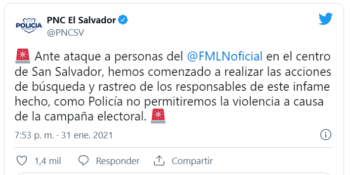
The culprits were linked to security forces of some ministries of the Executive Branch. This triggered criticism and blaming of President Nayib Bukele by officials of the opposition political parties (see image 2). The officials pointed out that these actions were the result of a message of hate against their parties (ARENA and FMLN), a message that characterized the president's electoral campaign.
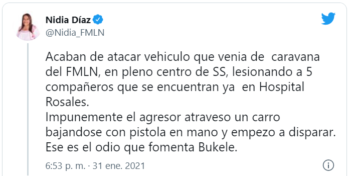
Despite the bloodshed, President Nayib Bukele did not pronounce himself in favor of the victims (see image 3). His messages were more in favor of the idea of a dirty fight of political speeches and maneuvers, wanting to make clear that the violent events were a desperate measure of the opposing political parties to tarnish the political campaign of his political force.
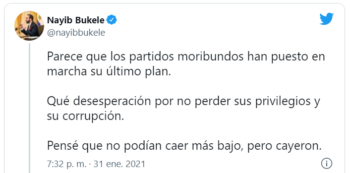
The president's messages against the two traditional parties are not in themselves messages that promote or incite a direct manifestation of violence. But for these parties and for international institutions, the violent event was the result of a populist campaign that focused on these opposition parties as the historical "enemies" of the people. Such discourse, enhanced by the electoral climate, generated a thirst for political revenge on the part of the population, which, combined with political and ideological fanaticism, resulted in the violent event.
2. Discriminatory speech against the LGBTIQ community
The congressman for the Nuestro Tiempo (Our Time) party, Johnny Wright Sol, was affected by a series of discriminatory homophobic speeches (see image 4 and 5) by followers of the ruling party.
The congressman, after an interview in which his partner (the Mexican Kris Goyri) appeared, showed an image to a television media where he looks happy with his partner (in this case the congressman). Such images caused a controversy in social networks (mainly on Twitter), many in support, others in criticism.
In the second case, the main drivers of this are accounts known and self-identified as ‘Officialist Troll Accounts’ who have created content in the form of ‘memes’ in which they mock and offend the integrity of the congressman. According to the document "Hate speech and incitement to violence against lesbian, gay, bisexual, trans and intersex people in America" (RELE, 2015), they damage and make the congressman vulnerable, especially in his work, since his image has been negatively impacted.
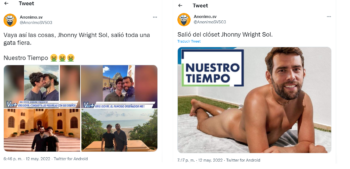

3. Declarations against gangs during the regime of exception
The messages against gangs after the approval of the state of exception also came from public officials. Below we will analyze a publication (see image 4) made by the Director of Penitentiary Centers and Vice Minister of Security and Justice, Osiris Luna, minutes before the
approval of the state of exception.
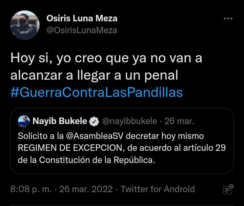
Image 7. Osiris Luna Meza: Today, yes, I think they will not be able to reach a penalty #WarAgainstTheGangs. Nayib Bukele: I solicited the @AssemblySV to declare today a State of Exception, in accordance with article 29 of the Constitution of the Republic.
(@OsirisLunaMeza)
The message is considered very dangerous, as it has a violent connotation followed by the phrase "War against gangs". Organized crime gangs in El Salvador are one of the major structural problems of the country, among so many problems this is the one that most concerns the population on a daily basis.
Publishing such a message, the source of which was a public official and being in a context of rising homicides by gangs, clearly generates a climate of revenge (and unconstitutional in the matter of legal proceedings) that can incite people to take justice into their own hands through violent acts. The message can easily be propagated as a message of war against gangs, promoting an attack on their fundamental right to life.
CONCLUSION
We must analyze and relate the different discourses promoted by the media according to their understanding of the social and political reality of the country. The stimuli or responses expected from the story is closely linked to the audience's perspective, which may be in favor, and the audience will feel identified and support the resource; or it may be against, and the audience may try to discredit the story (see image 7).
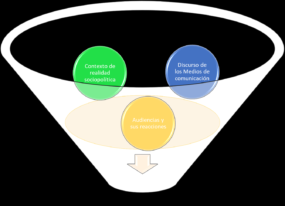
Through the manifestation of these represented elements, it can be mentioned that the socio-political reality generates different situations that lead to the dissemination of hate speeches where the aim is to emphasize who are the good guys and who are the bad guys, according to the opinion of the majority of the audience
into one of these sides, when it should be neutral. This leads to analyzing the importance of a fundamental issue: media and information literacy, which allows citizens to develop skills to have criteria to evaluate and analyze the discourse of media content, empowering audiences and making them less uncritical audiences.
It has been demonstrated in recent years the importance of audiences and that these are no longer passive but active and beyond being consumers of information, now individuals are also producers and generators of information, and to create and disseminate information, do not join to promote hate speech but critical positions to the issues that impact society
, it becomes necessary to empower themselves with information such as that which has been known in the certificate Freedom of Expression, Protection of Journalists and Peacebuilding, offered by the University for Peace.
REFERENCES
Constitución de la República. Art. 6. 20 de diciembre de 1983. El Salvador
Centro de documentación judicial de la Corte Suprema de Justicia de El Salvador. (1997, 14 de febrero). Inconstitucionalidad 15-96. https://www.jurisprudencia.gob.sv/DocumentosBoveda/E/1/2020-2029/2020/03/E5CD1.HTML
Constitución de la República. Art. 29. 20 de diciembre de 1983. El Salvador
Chaves-García, N. (2021). El Salvador: entre los discursos de odio y la negación del pasado. Centro Estratégico Latinoamericano de Geopolítica. https://www.celag.org/el-salvador-entre-los-discursos-de-odio-y-la-negacion-del-pasado/
Garrido, A. (2022). Discurso de odio y discursos discriminatorios –. Costa Rica: UPAZ. https://classroom.upeace.org/pluginfile.php/55296/mod_folder/content/0/UPAZ%20Discurso%20de%20odio%20y%20discursos%20discriminatorios%20-%20sesion%203.pdf
Luna, O. [@OsirisLunaMeza]. (2022, 26 de marzo). Hoy si, yo creo que ya no van a alcanzar a llegar a un penal #GuerraContraLasPandillas. [Texto]. Twitter. https://twitter.com/OsirisLunaMeza/status/1507902411029069828?ref_src=twsrc%5Etfw
RELE (2015). Discurso de odio y la incitación a la violencia contra las personas lesbianas, gays, bisexuales, trans e intersex en América https://www.oas.org/es/cidh/expresion/docs/informes/odio/Discurso_de_odio_incitacion_violencia_LGTBI.pdf
Short biographies
Marcela Aldana, Salvadoran, 28 years old. An optimistic person in life and eager to transmit that optimism to others. She graduated from Francisco Gavidia University with a specialization in Graphic Design and Advertising. She served me as a photographer and Creative Director. She also has a Diploma in radio and television production certified by the Salvadoran Association of Radio Broadcasters ASDER. Lover of music and of promoting the care of our planet through my environmental capsule BIOSPHERE that is broadcast on La Cadena ASDER.
Evelyn Yecenia Álvarez Juárezresponsible for Public Relations and Monitoring of Virtual Services at the Francisco Gavidia University Library. She graduated as a Librarian from the University of El Salvador and a degree in Public Relations and Communications from the Francisco Gavidia University. She is a trainer in the use of the library's Information Resources and carries out activities to promote electronic resources and develops communication plans. She also works as an internal quality auditor with the ISO 9001: 2015 standard, and in Environmental Management Systems. ISO14001:2015.
Mauricio López21-year-old student, resident in El Salvador; I am currently in my third year of the Bachelor's degree in Communication Sciences. At the prestigious Don Bosco University, in the wide world of communications, I have been interested in journalism and social communication. In this, I have been dedicating myself for 4 years to being the CM of different pages of volunteer associations; and at the same time, I dedicated myself to being a cultural activist and event organizer.
Enrique Alejandro Pineda Díaz, second year student of the Technician in Multimedia from the Don Bosco University. Passionate about film criticism and production. He has participated in independent film productions, as well as in the direction of his own short films with which he has participated in national festivals, such as the Icarus festival and the Festival of short films recorded with a cell phone at the ESCINE film school.

